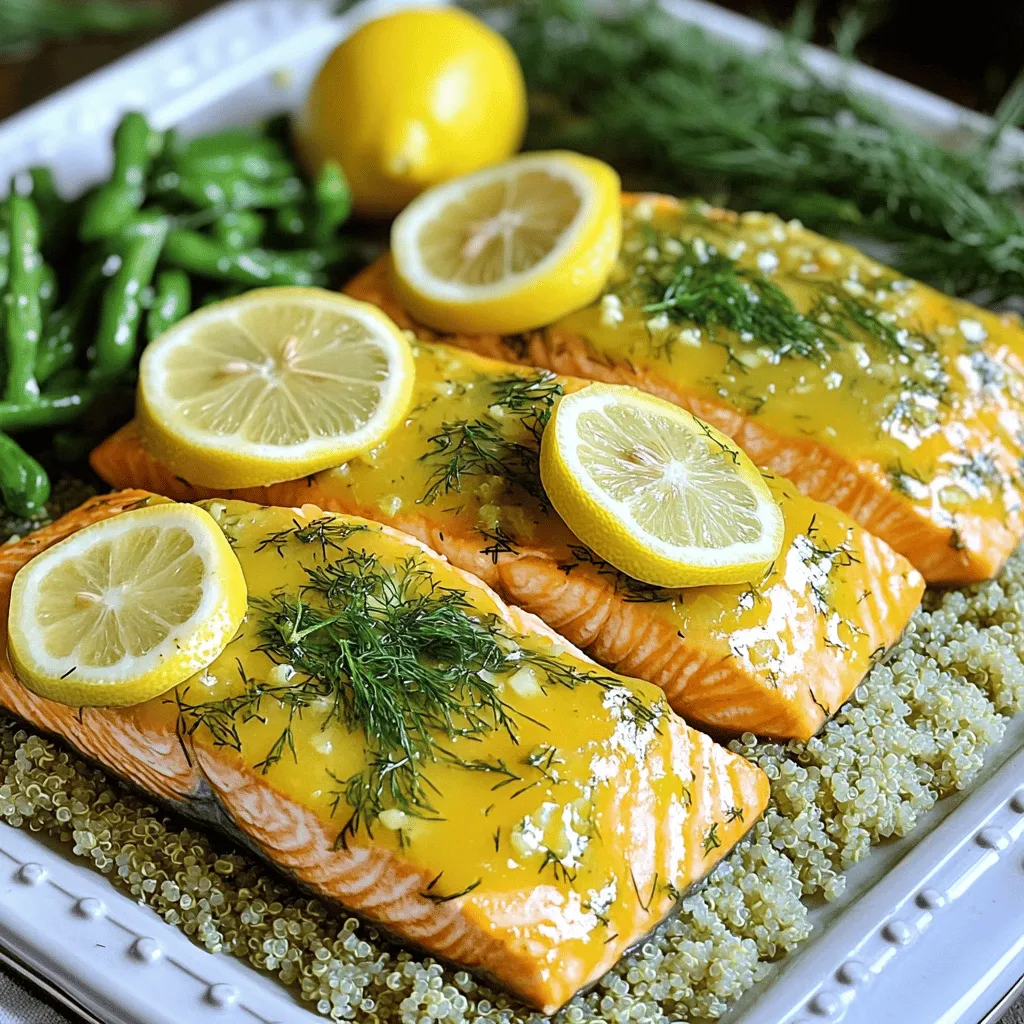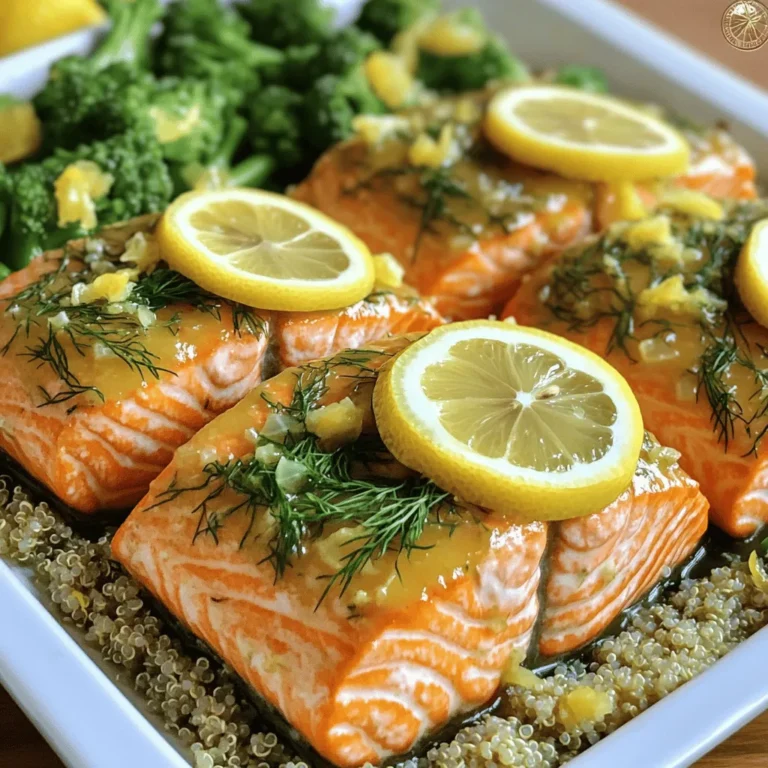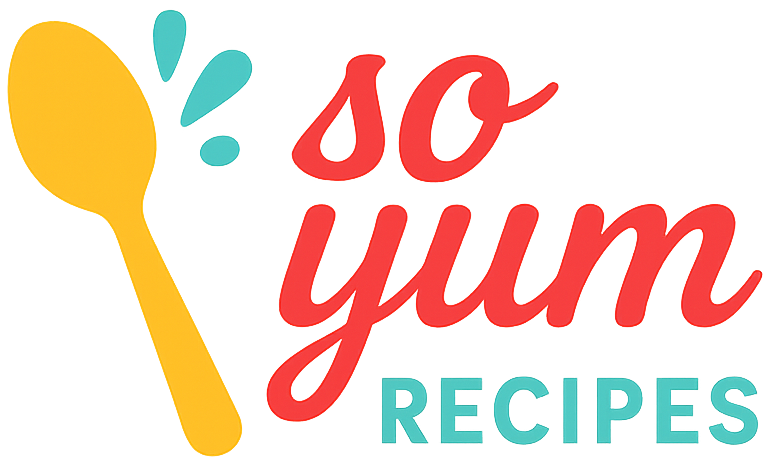Looking for a delicious and easy dinner? Try my Lemon Dill Salmon recipe! This flavorful dish combines fresh ingredients for a meal that’s light yet satisfying. With just a few simple steps, you can bake salmon to flaky perfection. Whether you’re a busy parent or a novice cook, this recipe fits right into your routine. Let’s dive into the tasty details and bring this dish to your table tonight!
Ingredients
List of Ingredients
– 4 salmon fillets (about 6 oz each)
– 2 tablespoons olive oil
– 1 lemon, zested and juiced
– 2 tablespoons fresh dill, chopped (or 1 tablespoon dried dill)
– 3 cloves garlic, minced
– Salt and pepper to taste
– Lemon slices for garnish
– Optional: Cooked quinoa or wild rice for serving
When making lemon dill salmon, fresh ingredients shine. I love using vibrant lemon zest and juice for bright flavor. Fresh dill gives the dish a lovely herbal note. If fresh dill is not available, dried dill works too. Garlic adds a nice aromatic punch that pairs well with the fish.
Make sure to season your salmon with salt and pepper. This step amplifies the flavors and enhances the taste. I often garnish my finished dish with lemon slices. They not only look pretty but also add a fresh burst of flavor.
For a hearty meal, serve the salmon over cooked quinoa or wild rice. These grains soak up the lemon dill sauce and make the dish even more satisfying.Enjoy crafting this delightful dish!
Step-by-Step Instructions
Prepping the Oven
– Preheat your oven to 400°F (200°C).
This step is key. A hot oven helps the salmon cook evenly.
Mixing the Marinade
– Combine olive oil, lemon juice, lemon zest, dill, garlic, salt, and pepper.
Mix these ingredients in a small bowl. The lemon juice adds brightness. The dill gives a nice herbal flavor.
Arranging the Salmon
– Place fillets in a baking dish and coat with the marinade.
Lay the salmon skin-side down. Use a brush or spoon to cover each fillet. Make sure every piece has a good amount of the mixture. Let it soak in for about 15-20 minutes. This waiting time helps the flavors blend.
Baking and Serving
– Bake salmon and garnish with lemon slices.
Put the dish in the oven. Bake for 12-15 minutes. The salmon is done when it flakes easily with a fork. After baking, add fresh lemon slices on top. This adds a nice touch and flavor. For a great meal, serve it with cooked quinoa or wild rice. You can drizzle any leftover marinade over the top for extra taste.
Tips & Tricks
Perfect Cooking Time
Monitoring cooking time is key to a great dish. Salmon cooks fast, so watch it closely. Bake it for 12 to 15 minutes. You want it just right, not overcooked. If you leave it too long, the fish can dry out. Use a fork to check. If it flakes easily, it’s done.
Flavor Enhancement
For a flavor boost, marinate the salmon. Let it sit for 15 to 20 minutes. This allows the lemon and dill to soak in. You can add herbs like parsley or thyme for extra taste. A touch of honey can balance the lemon’s tartness too. Experiment with spices like paprika for a warm kick.
Achieving the Right Texture
To ensure your salmon stays flaky and moist, start with fresh fish. Dry it gently with a paper towel before cooking. This helps the marinade stick. Avoid cooking at too high a temperature. Lower heat can help keep it tender. Adding a splash of broth or white wine in the dish can also help maintain moisture.

Variations
Grilled Lemon Dill Salmon
Grilling lemon dill salmon gives it a smoky taste. To grill, first, preheat your grill to medium-high heat. Brush the salmon fillets with the lemon dill mixture just like you do for baking. Then, place the fillets directly on the grill grates. Grill each side for about 4-5 minutes. Check for doneness by seeing if the salmon flakes easily. Grilled salmon has a great char and flavor that is hard to beat.
Lemon Dill Salmon with Different Herbs
You can switch up the herbs in this recipe. Try using fresh parsley, chives, or tarragon instead of dill. Each option brings a unique flavor to the dish. For example, tarragon adds a sweet, anise-like taste. If you want a more earthy flavor, rosemary works well too. Do not be afraid to mix and match. This way, you can create your own favorite version of lemon dill salmon.
Side Dishes to Pair
Pair your lemon dill salmon with tasty side dishes. Steamed green vegetables like asparagus or broccoli add color and crunch. A light salad with mixed greens and a lemon vinaigrette can brighten the meal. Quinoa or wild rice offers a hearty base that complements the salmon’s flavors. You can even serve it with roasted potatoes for a cozy vibe. These sides make your meal complete and satisfying.
Storage Info
Storing Leftovers
After you enjoy your lemon dill salmon, store leftovers properly. Place the cooked salmon in an airtight container. Make sure to cool it down first. This helps keep it fresh. Store the container in the fridge for up to three days. If you want to keep the salmon longer, freezing is a good option.
Reheating Guidelines
When you are ready to eat your leftovers, reheat the salmon carefully. The best way is to use the oven. Preheat the oven to 350°F (175°C). Place the salmon on a baking sheet. Cover it with foil to keep it moist. Heat for about 10-15 minutes or until warm. You can also use the microwave. If you choose this method, heat it in short bursts. Check after every 30 seconds. This will help you avoid overcooking.
Freezing Options
If you want to freeze your lemon dill salmon, follow these steps. First, let the salmon cool completely. Wrap each piece tightly in plastic wrap. Then, place them in a freezer-safe bag or container. Make sure to remove as much air as possible. Label the bag with the date. You can freeze the salmon for up to three months. To thaw, move the salmon to the fridge a day before you plan to eat it. This will help keep the taste and texture nice.
FAQs
How do I know when salmon is done?
You can tell if salmon is done by looking for a few signs. First, the salmon should change from a bright pink to a light pink or opaque color. Second, use a fork to gently flake the salmon. If it flakes easily, it is cooked. Finally, the thickest part of the fillet should reach an internal temperature of 145°F (63°C). Be careful not to overcook it. Overcooked salmon can become dry and tough.
Can I use frozen salmon for this recipe?
Yes, you can use frozen salmon. Just make sure to thaw it first. The best way to thaw salmon is to place it in the fridge overnight. If you’re in a hurry, you can seal it in a plastic bag and submerge it in cold water for about an hour. When using thawed salmon, you might need to adjust the baking time slightly. Check for doneness a few minutes earlier to avoid overcooking.
What can I substitute for dill?
If you can’t find dill, don’t worry! You can use other herbs. Fresh parsley or tarragon work well in place of dill. Basil also adds a nice flavor, but it changes the dish a bit. You can even try fresh chives for a mild onion taste. Experiment with these herbs to find your favorite flavor!
You’ve learned how to make a tasty lemon dill salmon. We covered key steps like mixing the marinade, baking, and serving perfectly. Remember to watch the cooking time for the best results. You can swap ingredients or try grilling for a new twist. Storing leftovers correctly helps keep your meal fresh. Keep experimenting with flavors and side dishes. Enjoy your cooking journey!


